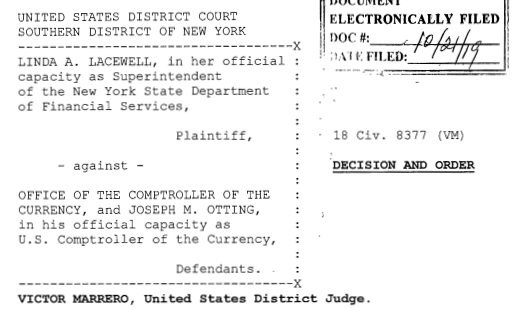Legal Briefs
OCC Believes It’s Time To Fix Madden Issue Once And For All
November 18, 2019 If a bank makes a legal loan to a consumer and then later sells the debt to a third party, the terms of the loan are still legal right?
If a bank makes a legal loan to a consumer and then later sells the debt to a third party, the terms of the loan are still legal right?
“Yes” should be the obvious answer, but in 2015 a federal appeals court said “no.” The case was Madden v. Midland Funding LLC, which started as a credit card debt owed by a consumer to Bank of America at 27% interest and ended as an allegedly illegal loan once the debt was sold to Midland Funding.
The ruling, which deBanked has covered extensively, shook the consumer and business loan markets in New York, Connecticut, and Vermont with its jurisdictional reach. Midland Funding appealed the ruling to the United States Supreme Court but the Court declined to hear the case.
Congress attempted to bring clarity to the lawfulness of the practice with a bill called the Protecting Consumers’ Access to Credit Act of 2017 but failed when the approved House bill never even came up for a vote in the Senate.
On Monday, the Office of the Comptroller of the Currency (OCC) proposed a rule to clarify the “Valid When Made” Doctrine that had been pierced in Madden. “This proposal will address confusion about the effect of a transfer on a loan’s valid interest rate, including confusion resulting from a recent decision from the U.S. Court of Appeals for the Second Circuit (Madden v. Midland Funding, LLC),” OCC wrote in a statement.
A 60-day public comment period will be open once the proposal is published in the Federal Register. To find out how to comment on the rule, click here.
Direct Lending Investments’ Ability to Collect From Largest Debtor Looks Uncertain
October 30, 2019 When Direct Lending Investments (DLI), one of the largest online lending hedge funds, went bust, many were surprised to learn that the fund had discreetly gambled heavily in the international telecom market.
When Direct Lending Investments (DLI), one of the largest online lending hedge funds, went bust, many were surprised to learn that the fund had discreetly gambled heavily in the international telecom market.
At present, a company called VOIP Guardian Partners I owes DLI $203 million. There’s a problem with recovery in that VOIP declared Chapter 7 bankruptcy this past March with little hope to repay because it itself re-loaned out DLI’s funds to telecom companies around the world and were supposedly never paid back.
VOIP is wholly owned by an individual named Rodney Omanoff, a former Hollywood talent agent. There is currently a criminal investigation into Omanoff for money laundering and “other criminal claims,” DLI’s receiver stated in a recent October report. Tens of millions of dollars potentially recoverable by DLI from VOIP are currently in the custody of The Netherlands while the investigation is being conducted.
Meanwhile, deBanked previously determined that VOIP had made bad loans of $158 million to companies purportedly in Hong Kong and United Arab Emirates, funds that came from DLI. The websites for both companies, Telacme Ltd. and Najd Technologies, Ltd, have gone offline.
The bizarre telecom investments in what was perceived to be a hedge fund focused almost entirely on the US online lending market, are not alone. DLI recently revealed that it also loaned millions to a company that put up the mineral rights for 6 oil and gas wells as collateral. It also loaned more than $25 million against a distressed commercial real estate property and a note backed by a VC investment in a cloud-based billing service company.
DLI’s receiver is not confident that it will collect the par amount of receivables on its books.
“Without providing individualized loan/portfolio assessments, the Receiver’s general assessment as of the date of this Report is that recoveries on the remaining loan/investment portfolio are likely to be far less than the $672.5 million in par value stated on the receivership books and records as of September 30, 2019. In fact, in connection with the filing of the 2018 tax returns the Receiver recorded a write down for tax purposes in the approximate amount of 40% of the par value of assets at December 31, 2018.”
Separately, the receiver wrote that most of DLI’s outstanding loan and investment portfolios are in “some form of financial distress or subject to disputes that may affect the timing and extent of recoveries on those portfolios.” It has attempted to keep the identity of those investments confidential so as not to cause any outside interference in those companies’ ability to repay.
Attorney Pleads Guilty In 1 Global Capital Securities Fraud Mess
October 25, 2019 Jan Douglas Atlas, a Florida attorney that was arrested last month for his role in the 1 Global Capital debacle, entered a plea of guilty on Wednesday to 1 count of securities fraud. 74-year-old Atlas also agreed to be disbarred.
Jan Douglas Atlas, a Florida attorney that was arrested last month for his role in the 1 Global Capital debacle, entered a plea of guilty on Wednesday to 1 count of securities fraud. 74-year-old Atlas also agreed to be disbarred.
The charges stem from his willingness to sign an opinion letter that claimed investment opportunities being offered by 1 Global were not securities when he knew that they actually were.
1 Global collapsed last year amid investigations by the SEC and US Attorney’s office and the discovery of a massive discrepancy in the company’s accounting records. Atlas is the 2nd person to be criminally convicted. 1 Global’s chairman consented to judgment with the SEC but has not been criminally charged. Court records indicate he has already satisfied the vast majority of the SEC’s judgment.
The set of facts established by prosecutors and Atlas in his guilty plea suggest that additional individuals could still be criminally charged.
Federal Judge Rules New York’s “Win” Against OCC’s Fintech Charter Nullifies The Fintech Charter Concept Entirely
October 21, 2019 The Office of the Comptroller of The Currency took a gamble with a federal judge in a lawsuit brought by the New York Department of Financial Services (DFS) and lost. On Monday, Judge Victor Marrero ruled that the OCC must “set aside” its special purpose (fintech) national bank charters entirely, not just for those with a nexus to New York.
The Office of the Comptroller of The Currency took a gamble with a federal judge in a lawsuit brought by the New York Department of Financial Services (DFS) and lost. On Monday, Judge Victor Marrero ruled that the OCC must “set aside” its special purpose (fintech) national bank charters entirely, not just for those with a nexus to New York.
The outcome is a byproduct of a ruling issued on May 2nd where the OCC had sought to dismiss the challenge from the onset. DFS was somewhat victorious then in that the case was allowed to proceed, be litigated, and eventually tried. But the OCC felt the case was lost before it had begun because “the Court [had already] ruled on the issue of the law at the heart of the case: whether, under the National Bank Act, OCC has the authority to issue special purpose national bank charters to financial technology companies that do not accept deposits.”
 The Court made it clear, that “OCC does not have the authority because the relevant language in the National Bank Act unambiguously defines ‘the business of banking to include deposit-taking.”
The Court made it clear, that “OCC does not have the authority because the relevant language in the National Bank Act unambiguously defines ‘the business of banking to include deposit-taking.”
As a result, OCC negotiated with DFS to reach an agreed upon final judgment in DFS’s favor. The only remaining question was to what level of defeat the OCC would concede. OCC argued a judgment should preclude only New York companies from applying for a fintech charter while the DFS argued it should apply beyond New York’s borders to all 50 states.
On Monday, the judge went with DFS’s version, pointing out that ordinarily prevailing on an Administrative Procedure Act claim, as OCC had indeed consented to judgment on, would mean that the agency’s order would be vacated, not that the plaintiff would win some special relief.
It is hereby ordered, adjudged and decreed that:
OCC’s regulation 5 C.F.R. 5.20(e)(1)(i), is set aside with respect to all fintech applicants seeking a national bank charter that do not accept deposits.
DFS Superintendent Linda A. Lacewell issued an official comment on the ruling:
This decision makes the financial well-being of consumers from New York and around the country a priority. It reflects the rational conclusion that DFS and other state banking regulators have the expertise to provide the strict supervisory oversight and enforcement of anti-money laundering and consumer protection statutes and regulations that non-depository financial service providers are required to follow. The decision stops OCC’s attempt to usurp state authority by establishing a federal fintech regulatory framework at the expense of consumers. Going forward, DFS will continue to be a fierce advocate for consumers in New York and nationwide.
New York Attorney General Secures Judgment Against Cardis Enterprises International
October 11, 2019 New York Attorney General Letitia James announced today that she had secured default judgments against numerous entities and individuals involved in a $30 million fraud.
New York Attorney General Letitia James announced today that she had secured default judgments against numerous entities and individuals involved in a $30 million fraud.
In December 2018, the New York Attorney General’s Office filed suit against Cardis and company personnel Aaron Fischman, Stephen Brown, Steven Hoffman, and Seth Rosenblatt for participating in the fraudulent marketing of Cardis to investors. The complaint further alleged that, while Cardis was raising significant investor funds, Fischman was fraudulently diverting much of the proceeds to enrich himself, family members, and his favored charities.
Default judgments were entered against Cardis Enterprises International N.V., Cardis Enterprises International (U.S.A.) Inc., Cardis Enterprises International B.V., and Chosen Israel LLC, along with several individuals related to Aaron Fischman as relief defendants.
“The case remains ongoing with several motions pending,” the AG wrote in a public statement, “including a motion for leave to amend the complaint to re-plead claims against Stephen Brown (who was previously dismissed from the case) and the remaining defendants.”
Head of MyPayrollHR Charged in Massive Nine-Year Bank Fraud
September 23, 2019 When MyPayrollHR left thousands of companies and their employees high and dry without their paychecks earlier this month, suspicion grew that the company’s rather mysterious owner, Michael Mann, may have been involved in some unsavory business. New information has emerged that around that time, Mann voluntarily checked in to the US Attorney’s office in Albany and admitted to a fraud he’d been running for 9 long years.
When MyPayrollHR left thousands of companies and their employees high and dry without their paychecks earlier this month, suspicion grew that the company’s rather mysterious owner, Michael Mann, may have been involved in some unsavory business. New information has emerged that around that time, Mann voluntarily checked in to the US Attorney’s office in Albany and admitted to a fraud he’d been running for 9 long years.
Since then, according to the Department of Justice, “Mann fraudulently obtained at least $70 million in loans from banks and other financial institutions. He created companies that had no purpose other than to be used in the fraud; fraudulently represented to banks and financing companies that his fake businesses had certain receivables that they did not have; and obtained loans and lines of credit by borrowing against these non-existent receivables.”
He has not paid them back. By the end, Mann resorted to kiting checks, the DOJ claims, in that he wrote checks back and forth to himself at different backs to inflate the balance of one or more accounts.
His largest creditor, Pioneer Bank, is owed tens of millions. Earlier this month, Mann attempted to route funds meant for his customers’ payrolls to an account at Pioneer Bank. Pioneer Bank responded by freezing all of the funds, causing all of MyPayrollHR’s clients to get caught in the crossfire.
Mann is charged with Bank fraud. If convicted, he faces up to 30 years in prison and a maximum $1 million fine.
Gone with the Wind: $35 Million Missing as Payroll Company Closes and President’s Home Raided
September 18, 2019 Knocking on the door of a lake-view house in Edinburg, NY last week, reporters from both the Times Union and Daily Mail were met with pleas from a woman to leave her property and notice that she would call 911 if they continued. This week the FBI come knocking instead.
Knocking on the door of a lake-view house in Edinburg, NY last week, reporters from both the Times Union and Daily Mail were met with pleas from a woman to leave her property and notice that she would call 911 if they continued. This week the FBI come knocking instead.
The woman is assumed to be Kim Mann, wife to Michael Mann, President of ValueWise Corp, who has recently vanished following the sudden closure of MyPayrollHR, a company belonging to ValueWise, and the disappearance of an estimated $35 million from employers who were using the company’s payroll services.
With his location currently unknown, Mann is at the center of a search for clarity as to what happened with the missing funds. Both the media, FBI, and victims of MYPayrollHR’s seeming misappropriation of funds are discussing his absence, with the last of these taking place in a Facebook group for those affected by the scandal.
The alarm bells began to ring on September 5th, when customers of MyPayrollHR were abruptly informed that the company would be shutting down that day. And they continued to ring when employers began receiving reports that their workers bank accounts had been docked the amount that should have been deposited for that pay period. Some victims have reported that they were credited twice for the same amount, and one employer has claimed that one of her employee’s had $1 million withdrawn from her account. The names on these transactions are a mix of the victims’ employers; MyPayrollHR; and Cachet Financial Service, a payroll processor that had been working with MyPayrollHR for twelve years.
Over 4,000 companies have been affected, with the number of employees impacted being in the tens of thousands. The unwarranted withdrawals have left many victims with negative balances, resulting in overdraft and late repayment fees.
Cachet similarly claims to be a victim, asserting that it risked losses of $26 million. Wendy Slavkin, General Counsel for Cachet, said last week in a Times Union interview that “as it stands today … the biggest victim, and really the only victim and victims, is Cachet … The employers are getting back their money, we are not.” This week it became clear that Cachet was responsible for withdrawing wages due from employers and depositing these in a holdings account, and that because of what Slavkin described as “manipulation,” these funds were deposited in accounts under Mann’s control. Cachet, realizing that it was now down $26 million, withdrew the amounts due to employees from their accounts.
Slavkin’s claim of Cachet being the singular victim has been decried by members of the Facebook group ‘victims of MyPayrollHR and CachetFS,’ which over 2,000 have joined. “How can you be general counsel for a bank that specializes in payroll and not understand how banking or payroll work?” Asked one user. “What is wrong with Wendy Slavkin?!” Asked another. And “Cachet Banq is just as scummy as MyPayrollHR has turned out to be,” asserted a third. One member of the group also stated their intentions to file a lawsuit against Cachet this week.
Meanwhile, other payroll companies have been active within the group. DailyPay has set up a $25,000 relief fund to aid victims pay off their overdraft and late fees, and Paylionce has been privately messaging members of the group offering their payroll services.
Vocal members have urged others to report their cases to the National Automated Clearing House Association, saying that they have helped with the recovery of their wages, especially those who are with Bank of America. While others have claimed that Cachet has partially refunded what was credited, restoring the first withdrawal to the account but not the second.
Currently, uncertainty remains as to what exactly happened with the $35 million that has gone missing. Michael Mann is seemingly nowhere to be found and no media outlet has been able to produce a photo of either Michael or his wife Kim. The former’s LinkedIn profile is sparse except for two entries in his work history as well as endorsements for, among other things, strategic planning and customer relationship management.
All that there is to work off is a panicked call that Mann made to the Edinburg Building Department on September 5th, in which he asked about a permit he had received the previous year to build a two-car garage with a bedroom and bathroom above it onto his home in Adirondack Park, which he noted might have to be sold.
Prominent Attorney Criminally Charged In 1 Global Capital Mess
September 17, 2019 Another individual has been criminally charged in connection with the 1 Global Capital securities case. 74-year-old Jan Douglas Atlas, a securities attorney, was charged with 1 count of securities fraud by the US Attorney in South Florida on Tuesday for authoring opinion letters in 2016 that falsely described that the investments were not securities nor subject to federal securities laws or registration requirements.
Another individual has been criminally charged in connection with the 1 Global Capital securities case. 74-year-old Jan Douglas Atlas, a securities attorney, was charged with 1 count of securities fraud by the US Attorney in South Florida on Tuesday for authoring opinion letters in 2016 that falsely described that the investments were not securities nor subject to federal securities laws or registration requirements.
The charges allege that Atlas “came to understand” that individuals representing 1 Global were not interested in accurate legal advice based on real facts and that they instead wanted false legal cover that would advance the desired outcome to continue to profit from 1 Global. He allegedly made false and misleading statements despite knowing the true nature of how the investments worked and that they were in fact securities as defined under federal securities laws.
“Atlas’s opinion letters were used and relied upon by 1 Global employees and agents to continue to raise money illegally,” the Department of Justice said in an announcement.
Atlas was also compensated by receiving a percentage of the commissions generated from the fundraising scheme to the tune of $627,000 paid to his personal checking account. These payments were not disclosed to his employer, Kopelowitz Ostrow, as required.
Atlas was also separately charged by the SEC.
His employer was not charged with any wrongdoing in either action. Atlas was previously listed as a partner at the firm but is no longer on the firm’s website.
Atlas is the second individual to be criminally charged in connection with 1 Global Capital. The first individual, Alan Heide, who served as 1 Global Capital’s CFO, pleaded guilty to conspiracy to commit securities fraud. He is scheduled to be sentenced on December 12th.





























